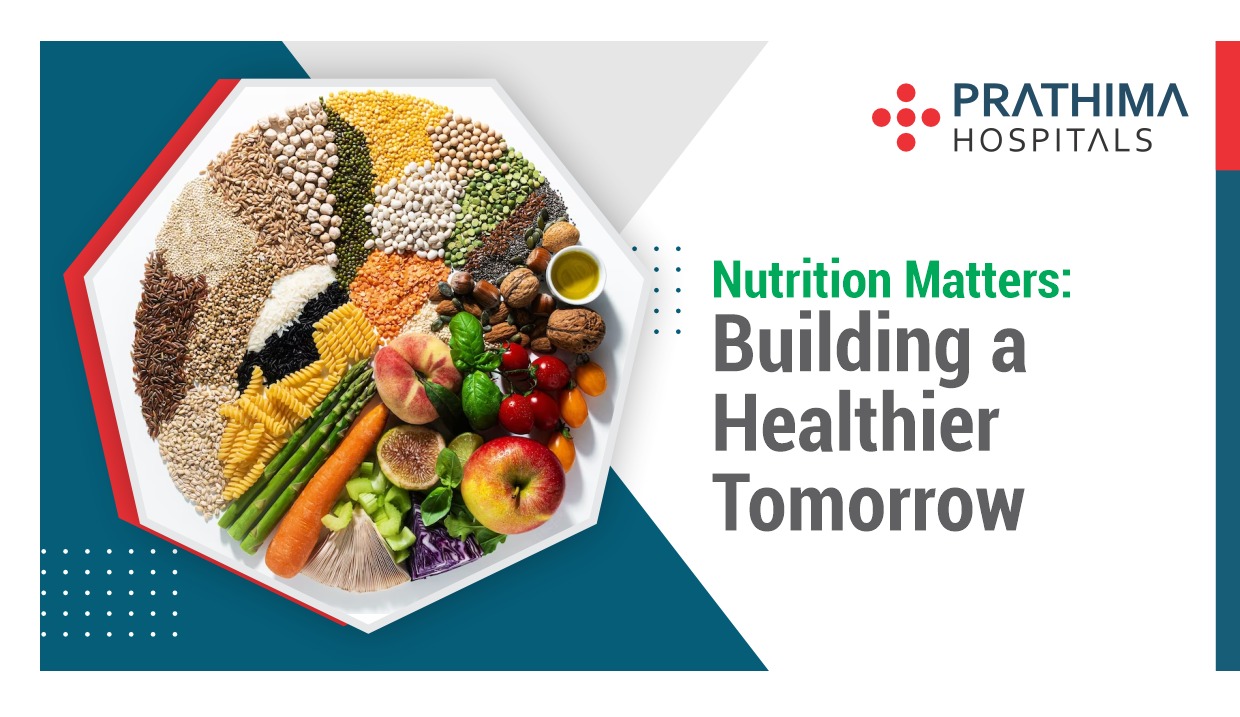Fuel Your Body With Good Nutrition, And Watch How It Transforms Your Life!

Importance of Nutrition
Introduction:
A healthy and well-nourished body is the foundation of good health. It plays a vital role in every aspect of our lives, from our physical health to our mental and emotional well-being. The importance of nutrition cannot be overstated, as it directly affects our energy levels, immune system, cognitive function, and even our longevity as per the Best General Physician in Hyderabad, Prathima Hospitals. As we celebrate National Nutrition Week, from September 1st to 7th, we will explore how nutrition impacts our health and why it should be a top priority for everyone.
I. The Basics of Nutrition:
Before we dive into the importance of nutrition, let’s start with the fundamentals. Nutrition refers to the process of acquiring, absorbing, and using nutrients from the foods we consume. Nutrients are the essential substances our bodies need to function correctly. These nutrients can be broadly categorized into six main groups:
- Carbohydrates: These provide the body with energy, and they are found in foods like grains, fruits, vegetables, and legumes.
- Proteins: Essential for building and repairing tissues, proteins are found in foods such as meat, poultry, fish, dairy products, beans, and nuts.
- Fats: Fats are a concentrated source of energy and are crucial for various bodily functions. They are present in foods like oils, butter, avocados, and fatty fish.
- Vitamins: These are organic compounds that play critical roles in various biochemical processes in the body. Vitamins can be sourced from a diverse array of foods, spanning fruits, vegetables, dairy products, and meats.
- Minerals: Essential for maintaining proper bodily functions, minerals are found in foods such as leafy greens, nuts, dairy products, and whole grains.
- Water: Often overlooked, water is a vital nutrient that is necessary for virtually every bodily function. Good hydration is critical for general health.
II. Energy and Physical Health:
- Fuel for the Body: One of the primary roles of nutrition is to provide the body with the energy it needs to function. Carbohydrates, fats, and proteins are the primary sources of energy, with carbohydrates being the body’s preferred source. When we consume these macronutrients, our digestive system breaks them down into glucose, which is used by our cells as fuel. Without a steady supply of energy through proper nutrition, our bodies would struggle to perform even the most basic functions.
- Maintaining a Healthy Weight: Weight management is significantly impacted by nutrition as well. Consuming a balanced diet that includes the right proportion of macronutrients can help us maintain a healthy weight. Excessive consumption of high-calorie, low-nutrient foods can lead to weight gain and obesity, which are associated with a host of health problems, including heart disease, diabetes, and certain cancers. Conversely, a diet rich in nutrient-dense foods helps us maintain an optimal weight and reduce the risk of these chronic conditions.
III. Immune System Function:
Our immune systems protect us from infections and diseases. Proper nutrition plays a pivotal role in supporting and strengthening the immune system. Here’s how:
- Micronutrients: Vitamins and minerals, such as vitamin C, vitamin D, zinc, and selenium, are critical for immune function. These nutrients help regulate immune responses, promote the production of antibodies, and enhance the body’s ability to fend off pathogens.
- Antioxidants: Many fruits and vegetables are rich in antioxidants, which help combat oxidative stress and inflammation. A diet high in antioxidants can bolster the immune system and reduce the risk of chronic diseases.
- Gut Health: The gut microbiota plays a significant role in immune function. A diet rich in fibre and probiotics can support a healthy gut microbiome, which in turn enhances immune function.
- Protein: Adequate protein intake is essential for the production of antibodies and immune system cells. Insufficient protein intake can impair the immune system’s effectiveness.
IV. Cognitive Function and Mental Health:
According to the Best General Physician in Kukatpally, Nutrition doesn’t just impact our physical health; it also has a profound influence on our cognitive function and mental well-being. Here’s how nutrition affects the brain:,/p>
- Brain Development: Proper nutrition during infancy and childhood is critical for healthy brain development. Nutrients like omega-3 fatty acids, choline, and iron play essential roles in building and maintaining brain structures.
- Cognitive Function: The brain requires a constant supply of glucose and nutrients to function optimally. Consuming a balanced diet with a steady source of energy helps maintain focus, memory, and cognitive performance.
- Mood Regulation: Research suggests that certain nutrients, such as omega-3 fatty acids and B vitamins, can influence mood and reduce the risk of depression and anxiety.
- Neurological Disorders: Nutrition can also play a role in the prevention and management of neurological disorders, such as Alzheimer’s disease and dementia. Antioxidants and anti-inflammatory nutrients are particularly important in this regard.
V. Longevity and Aging:
As we age, the role of nutrition in our lives becomes even more apparent. Proper nutrition can significantly impact the ageing process and promote longevity:
- Cellular Health: The nutrients we consume directly affect the health and integrity of our cells. Antioxidants and anti-inflammatory compounds found in fruits and vegetables can help protect cells from damage and delay the ageing process.
- Bone Health: Adequate calcium and vitamin D intake is crucial for maintaining strong and healthy bones, reducing the risk of osteoporosis and fractures in later life.
- Heart Health: A diet low in saturated and trans fats, combined with high fibre intake, can lower the risk of cardiovascular diseases, such as heart attacks and strokes.
- Joint Health: Proper nutrition can reduce inflammation and promote joint health, reducing the risk of conditions like arthritis.
VI. Lifestyle and Disease Prevention:
The significance of nutrition extends to disease prevention and management. A well-balanced diet can help prevent a wide range of chronic diseases, including:
- Heart Disease: A diet low in saturated and trans fats, cholesterol, and sodium, coupled with high fibre intake, can reduce the risk of heart disease.
- Diabetes: Maintaining a healthy weight through proper nutrition can help prevent type 2 diabetes, while proper carbohydrate management is essential for those with diabetes.
- Cancer: Certain dietary patterns, including a diet rich in fruits and vegetables, have been linked to a reduced risk of various types of cancer.
- Hypertension: Reducing sodium intake and consuming foods rich in potassium can help manage and prevent high blood pressure.
- Gastrointestinal Health: Fiber-rich foods support digestive health and reduce the risk of gastrointestinal disorders.
VII. Nutrition and Lifestyle Choices:
It’s important to note that nutrition is not an isolated aspect of our lives. According to the Best General Physician in Kachiguda, it is closely intertwined with our lifestyle choices, including physical activity, sleep, and stress management. Adopting a holistic approach to health that encompasses all these factors is essential for reaping the full benefits of proper nutrition.
- Physical Activity: Regular exercise complements a healthy diet by helping to maintain a healthy weight, improve cardiovascular health, and enhance overall well-being.
- Sleep: Restorative sleep is imperative for the body’s repair and rejuvenation. Poor sleep can disrupt hormonal balance, appetite regulation, and overall health. Nutrition plays a role in sleep quality, with certain foods and nutrients promoting better sleep.
- Stress Management: Chronic stress can lead to unhealthy eating habits and affect digestion. Stress management techniques, combined with a nutritious diet, contribute to overall well-being.
VIII. The Impact of Modern Diets:
In recent decades, there has been a significant shift in dietary patterns, with an increase in the consumption of processed and fast foods, sugary beverages, and high-fat, high-sugar snacks. This shift has led to a rise in diet-related health problems, including obesity, diabetes, and heart disease. The modern diet often lacks essential nutrients while being high in empty calories, leading to malnutrition despite overconsumption of calories.
Furthermore, busy lifestyles and the convenience of fast food have contributed to a decrease in home-cooked meals made from fresh, whole ingredients. This has resulted in a disconnect between people and the food they consume, leading to less awareness of the nutritional value of their diets.
IX. Strategies for a Balanced Diet:
To harness the benefits of proper nutrition, it’s important to adopt a balanced and sustainable approach to eating. Here are some strategies for maintaining a nutritious diet:
- Eat a Variety of Foods: Consuming a wide range of foods ensures that you receive a diverse array of nutrients. Aim to include different fruits, vegetables, grains, proteins, and fats in your diet.
- Portion Control: Exercise portion control to prevent overindulging. Use smaller plates, and be mindful of your body’s hunger and fullness cues.
- Limit Processed Foods: According to the Best General Physician in KPHB, reduce your intake of processed foods high in added sugars, salt, and unhealthy fats. Choose whole, unprocessed foods as your preferred option whenever feasible.
- Stay Hydrated: Ensure proper hydration by drinking an ample amount of water throughout the day. Limit sugary drinks and excessive caffeine.
- Balanced Macronutrients: Aim for a balance of carbohydrates, proteins, and fats in each meal. Select whole grains, lean sources of protein, and nutritious fats for your dietary choices.
- Mindful Eating: Pay attention to your eating habits. Avoid distractions during meals and savour each mouthful, which can assist in preventing overconsumption and enhancing the digestive process.
- Plan and Prepare Meals: Planning your meals in advance and cooking at home allows you to have more control over your food choices and ingredients.
- Read Labels: Learn to read food labels to understand what you’re consuming. Look for added sugars, unhealthy fats, and excessive sodium content.
- Consult a Registered Dietitian: If you have specific dietary concerns or health conditions, consider seeking guidance from a registered dietitian who can provide personalized advice.
X. Conclusion:
Nutrition is undeniably a cornerstone of our daily lives and our overall health and well-being. It affects every aspect of our existence, from our physical health and immune function to our cognitive abilities and emotional well-being. Understanding the significance of nutrition and making informed dietary choices is essential for leading a healthy and fulfilling life.
By embracing a balanced and mindful approach to nutrition, we can reduce the risk of chronic diseases, enhance our quality of life, and increase our chances of living a longer, healthier life. Remember that it’s never too late to start prioritizing your nutrition and making positive changes to support your health and well-being. In doing so, you invest in a brighter and healthier future for yourself and those around you.
.
.
.
.
.
For More Details:
📞:: 733 733 6600 | 040 4345 4345
🌐:: https://prathimahospitals.com/book-appointment/



